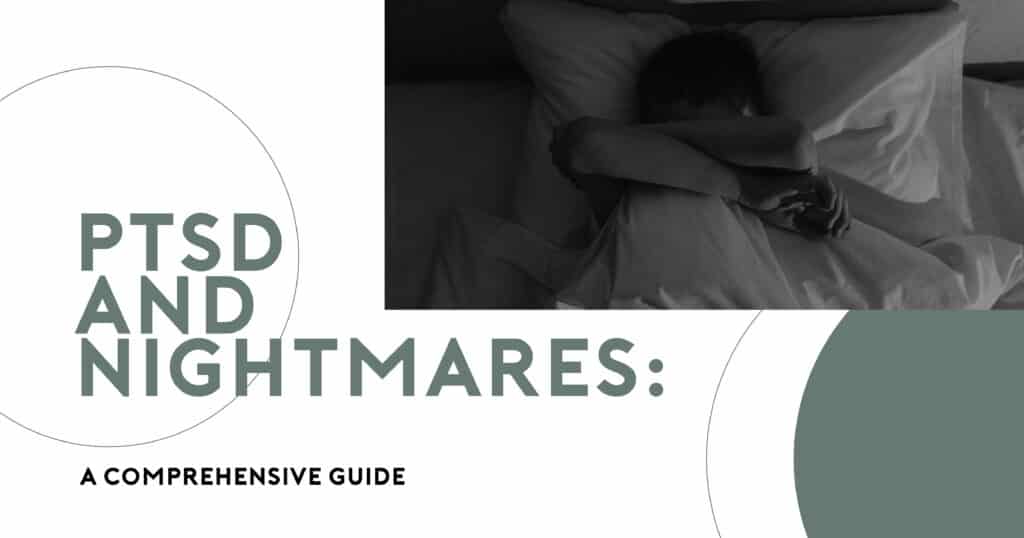For many living with Post-Traumatic Stress Disorder (PTSD), nightmares aren’t just occasional bad dreams – they’re vivid, recurring disruptions that replay trauma and disturb sleep. Research shows that up to 70% of individuals with PTSD experience frequent nightmares, making sleep one of the most affected aspects of recovery.
The link between PTSD and nightmares reflects how trauma embeds itself not just in memory, but in the body’s rhythm of rest. These sleep disturbances can fuel anxiety, interfere with healing, and make daily life feel even harder.
In this guide, we’ll explore why nightmares happen, how they impact mental health, and what science says about treating them. From coping strategies and stress management to sleep therapy and emotional healing, you’ll find practical tools to support deeper rest and deeper recovery.
Understanding PTSD and Nightmares
Post-Traumatic Stress Disorder (PTSD) is a mental health condition triggered by experiencing or witnessing a traumatic event. One of the most common and debilitating symptoms of PTSD is recurring nightmares – vivid, distressing dreams that often replay elements of the traumatic experience. These nightmares can make it difficult for individuals to feel safe, even while sleeping, leading to chronic fear, sleep avoidance, and emotional exhaustion.
The relationship between PTSD and nightmares is more than symbolic – these night terrors are often direct expressions of unresolved trauma, disrupting both sleep and the body’s natural recovery process. Without intervention, they can become a barrier to healing.
Tennessee Behavioral Health
The Connection Between Trauma Recovery and Nightmares
Nightmares can act as a signal that trauma is still active within the nervous system. While some dreams may be the mind’s attempt to process emotional pain, persistent and emotionally intense nightmares can actually stall trauma recovery. They disrupt sleep cycles, reinforce fear, and increase overall stress levels.
That’s why addressing nightmares is a critical part of holistic trauma recovery. The emotional and physical restoration from healthy sleep is essential to emotional healing, stress management, and long-term mental health. The table below breaks down how nightmares interact with different aspects of recovery:
| Aspect of Recovery | Impact of Nightmares |
| Sleep Quality | Frequent waking, fragmented sleep, difficulty returning to sleep |
| Emotional Regulation | Heightened irritability, anxiety, and emotional reactivity |
| Daytime Functioning | Fatigue, poor concentration, and low motivation |
| Anxiety Relief | Increased baseline anxiety and fear of falling asleep |
| Therapeutic Progress | Re-triggering of trauma, slowed cognitive-behavioral outcomes |
| Coping Strategies | Avoidance behaviors, sleep medication reliance, and substance use |
How Sleep Disturbance Affects Mental Health
When sleep is consistently interrupted by trauma-related nightmares, the effects ripple far beyond nighttime. Poor sleep contributes to a range of mental health challenges, weakening emotional resilience and intensifying symptoms of PTSD and related disorders.

Here are some key ways sleep disturbance affects mental health:
- Lowers the brain’s ability to regulate mood and stress
- Increases vulnerability to anxiety and depressive symptoms
- Weakens memory, focus, and cognitive function
- Heightens emotional reactivity and impulsiveness
- Erodes motivation and energy for daily activities
- Interferes with long-term therapeutic and recovery progress
Anxiety Relief Techniques for Better Sleep
Nighttime anxiety is one of the main reasons people with PTSD and nightmares struggle to fall or stay asleep. The anticipation of distressing dreams can trigger hypervigilance, racing thoughts, and even panic – all of which interfere with restful sleep. Incorporating anxiety relief techniques into a nightly routine can help calm the nervous system and reduce the intensity or frequency of nightmares.
Some proven techniques include:
- Progressive muscle relaxation (PMR) to reduce physical tension
- Mindful breathing or guided meditation to calm the mind before bed
- Establishing a consistent sleep schedule to support circadian rhythms
- Using weighted blankets for added sensory comfort and grounding
- Journaling or expressive writing to release intrusive thoughts before sleep
- Limiting screen time and stimulation in the hour before bedtime
Effective Stress Management for Reducing Nightmares
Stress is a known trigger for nightmares, especially for those navigating trauma recovery. High cortisol levels, emotional overwhelm, and daily tension can all contribute to disrupted sleep patterns and vivid dreaming. Learning to manage stress in waking life directly supports better sleep at night.
Effective stress management techniques can significantly reduce the frequency and intensity of trauma-related nightmares. Integrating these strategies into daily routines builds resilience and helps shift the nervous system out of a constant state of alert.
Some key approaches include:
- Daily physical activity to discharge built-up tension
- Time in nature or green spaces to promote relaxation
- Setting boundaries to reduce overstimulation and emotional fatigue
- Therapeutic support, such as EMDR or CBT, to target the trauma source
- Breathing exercises and yoga, especially in the evening
- Creative outlets, such as art, music, or movement, to express emotion nonverbally
Emotional Healing and Its Role in Managing Nightmares
Healing from trauma is not just about symptom relief – it’s about rebuilding trust in the body, the mind, and the world around you. Emotional healing plays a foundational role in reducing trauma-induced nightmares, as unresolved emotions often find their way into dreams when left unprocessed.
As individuals work through their trauma with professional support and compassionate self-care, the emotional charge that fuels nightmares begins to dissipate. Therapy, community, and consistent self-nurturing all contribute to this healing process. Over time, the brain no longer needs to replay trauma each night as it learns to feel safe again, both awake and asleep.
Coping Strategies for Nightmares in PTSD
Managing nightmares in PTSD isn’t just about stopping the dreams – it’s about creating a sense of safety around sleep itself. Developing personalized coping strategies helps individuals regain control, reduce nighttime anxiety, and foster healthier sleep habits. These strategies don’t eliminate trauma overnight, but they provide essential tools for navigating sleep with more confidence and less fear.
Here are several coping strategies commonly recommended by trauma specialists:
- Establish a calming bedtime routine to create predictability and comfort
- Use imagery rehearsal therapy (IRT) to rewrite and rescript recurring nightmares
- Sleep with a small light on or keep comforting objects nearby to feel secure
- Practice grounding techniques before bed, especially during emotional triggers
- Track sleep and nightmares in a journal to recognize patterns and triggers
- Avoid caffeine, alcohol, and stimulating content in the evening
- Seek professional support to explore and process unresolved trauma
Tennessee Behavioral Health
Explore Personalized Treatment Options at Tennessee Behavioral Health
Nightmares may be one of the most haunting symptoms of PTSD, but with the right support, healing is possible. If you or someone you care about is struggling with trauma-related sleep issues, don’t wait in silence. The path to restful sleep, emotional balance, and full recovery starts with understanding and support tailored to your needs.
At Tennessee Behavioral Health, we specialize in comprehensive, individualized care for those living with PTSD and related conditions. From coping strategies and stress management to advanced sleep therapy, our team guides you every step of the way.
Contact Tennessee Behavioral Health today to learn more about our trauma recovery programs and how we can help you reclaim your nights and peace of mind.

FAQs
What is the relationship between PTSD and nightmares, and how do they impact mental health?
Nightmares are a common symptom of PTSD, often replaying traumatic experiences during sleep. These episodes can lead to chronic sleep disturbance, increased anxiety, and worsened mental health over time.
How can effective stress management contribute to reducing nightmares in individuals with PTSD?
Reducing daily stress can lower the emotional intensity that fuels nightmares. Practicing regular relaxation techniques helps regulate the nervous system and promotes more stable, restorative sleep.
What are some anxiety relief techniques that can improve sleep quality for those experiencing PTSD-related nightmares?
Techniques such as deep breathing, progressive muscle relaxation, mindfulness meditation, and journaling before bed can help calm the mind and body. Creating a predictable and peaceful bedtime routine is also key.
How does emotional healing play a role in managing nightmares linked to PTSD?
As trauma is processed and resolved through therapy and self-care, the emotional intensity of nightmares often lessens. Emotional healing reduces the brain’s need to revisit trauma during sleep.
Tennessee Behavioral Health
What are the benefits of sleep therapy in the recovery process for PTSD sufferers experiencing nightmares?
Sleep therapy addresses the root of trauma-related sleep issues, helping individuals reestablish healthy sleep patterns. It also enhances overall recovery by supporting emotional regulation, mental clarity, and physical resilience.




